Do you grow your own cannabis or have access to trim? Are you wondering what you can do with all of those excess fan and sugar leaves? Are they even worth saving? The answer is YES and you can use this guide to learn how you can collect your cannabis trim to make edibles and topicals at home.
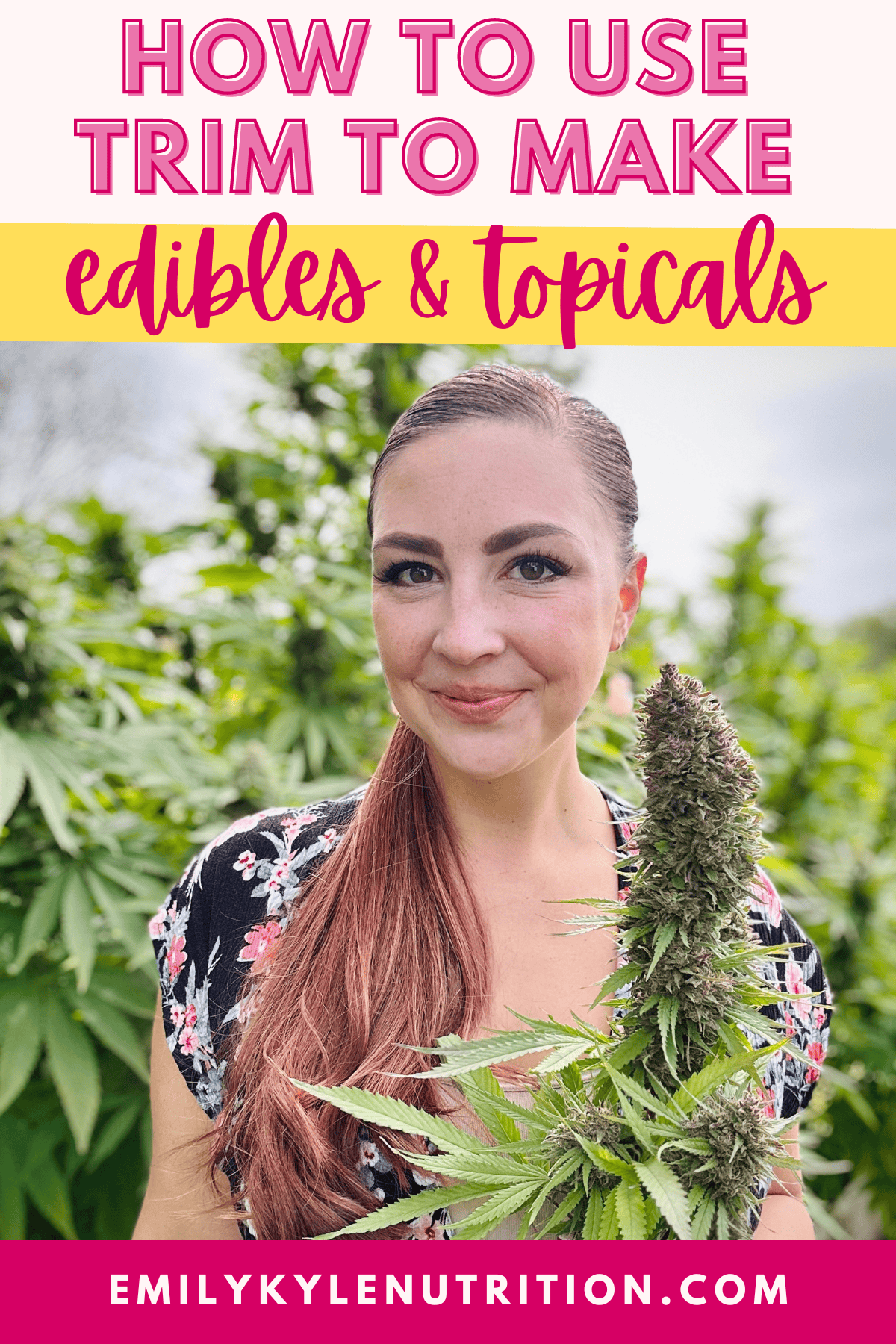
Table of Contents
- Article Features
- Why You Will Love This Guide
- What Is Trim?
- How to Make Edibles with Trim
- What Can I Make?
- Use Trim to Make Cannabis Oil
- Use Trim to Make Cannabutter
- Use Trim to Make a Tincture
- Don’t Want The Burn of a Tincture?
- Use Trim to Make a Staple Recipe
- Use Trim as a Spice Additive
- Use Trim to Make Topicals
- Collect The Kief
- How to Calculate the Potency
- How To Use Trim To Make Edibles, Cannabutter, and More Recipe
- Frequently Asked Questions
- Final Thoughts
- More Guides You Will Love
Article Features
- Tips and tricks to get the most yield out of your product
- How to put the trim to good use and make tasty edibles
- Not actually growing this year? That doesn’t mean you can’t enjoy the benefits! Shop with me and have my premium, high-quality cannabis products delivered directly to your door! Now shipping across the US.
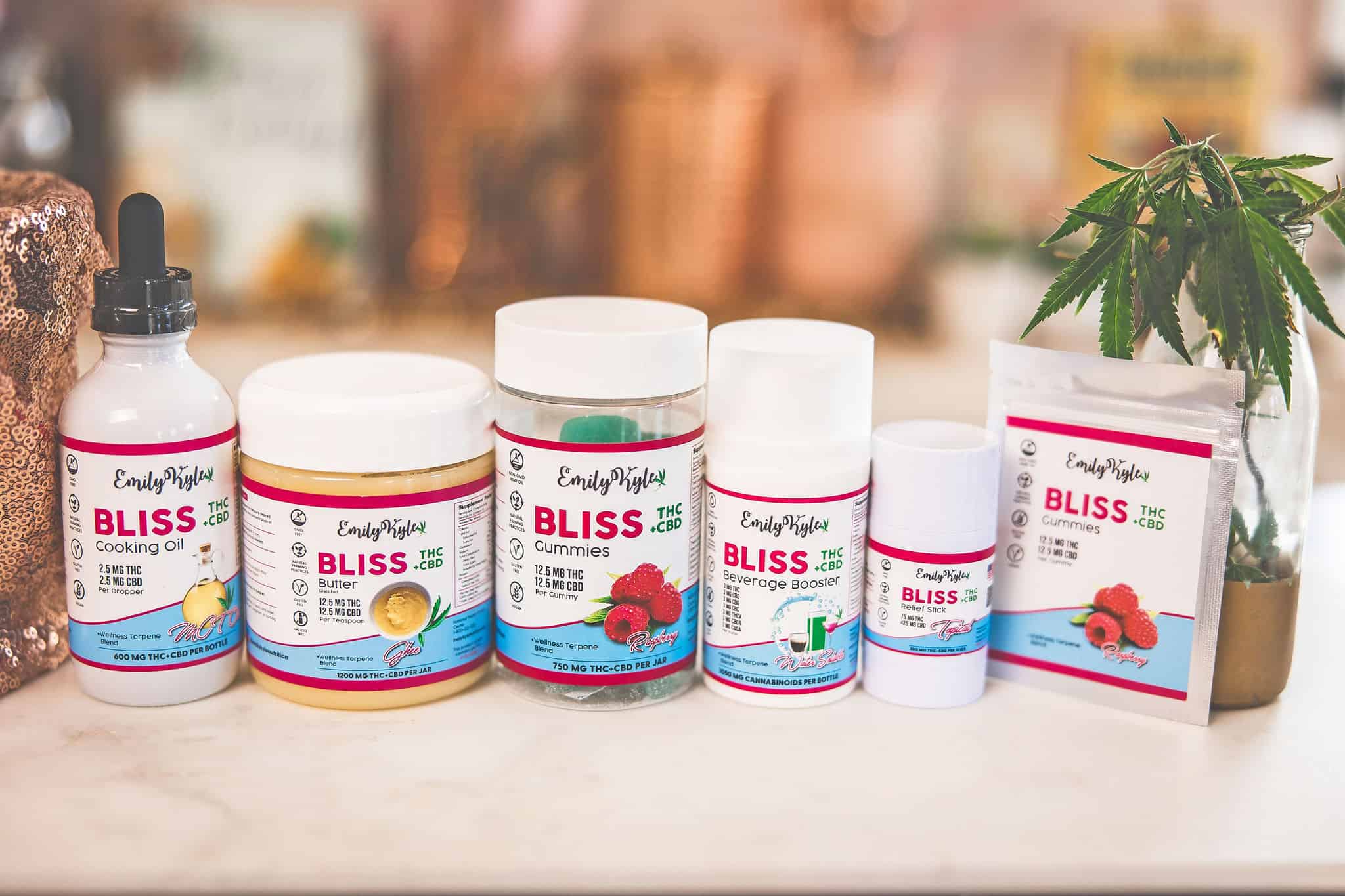
Why You Will Love This Guide
If you grow your own cannabis, you know that trimming your plant is important for a few different reasons.
Early in the growing stage, trimming can help encourage more bountiful yields and can help keep your plant healthy.
Later, after harvest, trimming the remaining leaves helps to ensure only the strongest, most potent part of the plant – the cannabis buds – are left.
Unfortunately, not everyone knows what to do with the small leaves, or trim, that’s left over, and it’s a question I’ve been asked many times in my Well With Cannabis Community.
So – is trim just waste, or can you actually use it?
Great news – it’s perfect for making edibles and topicals!
Read on to learn more about what trim is and how you can use it in your homemade edibles and topicals to ensure nothing goes to waste, including beneficial THC.
What Is Trim?
Cannabis trim is the leaves that you intentionally prune from the cannabis plant before, during, or after your cannabis harvest.
There are two types of leaves, each based on where they are taken from the plant: fan leaves and cannabis sugar leaves.
The first type is called fan leaves which are the larger leaves that you prune off the large branches of the cannabis plant.
Fan leaves are not the best choice for edibles if you’re hoping to enjoy an intoxicating experience, and some may even consider them one of the most unnecessary parts of the plant.
That’s because larger fan leaves have very few trichomes, cannabinoids, and terpenes and a lot of chlorophyll.
The good news? They are extremely nutritious and can be juiced, used in salads, and more.
That leaves us with the second type of trim leaves, the sugar leaves. These leaves are quite small, and you can find them growing on the buds of your cannabis plants.
Sugar leaves have more trichomes than fan leaves and, therefore, more cannabinoids and terpenes.
Many of these trichomes can be seen with the naked eye and are the reason for the name ‘sugar’ leaves, as they look like tiny sugar crystals.
This means you will be getting more medicinal compounds and a more intoxicating experience if working with THC.
So, yes, some trim does have value – but not all trim is created equal. Sugar leaf trim is better than fan leaf trim.
If you need more plant guidance, be sure to check out this anatomy of a cannabis plant guide.
⚠️ A Note About Shake: Shake isn’t the same thing as trim, although the terms are often used interchangeably. Shake is the collection of stems, leaves, and popcorn buds that naturally fall off your dried cannabis in a closed container. Shake may actually have a higher cannabinoid and THC concentration than traditional trim due to the accumulation of trichomes.
How to Make Edibles with Trim
Now, for the part you’ve been waiting for, how to make edibles with trim.
Overall, you really can use trim just as you would cannabis flower, but there are a few subtle differences to be aware of.
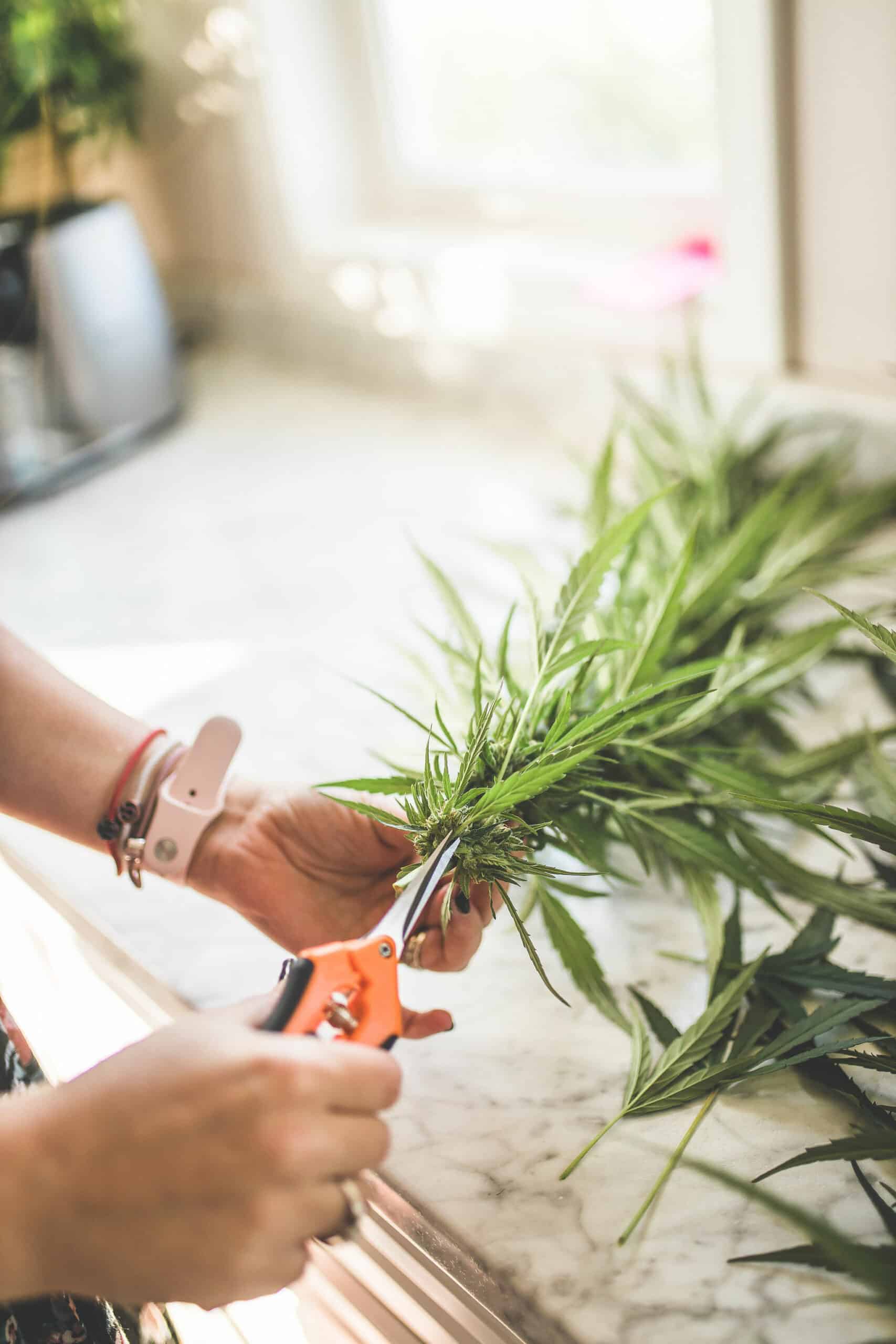
Fresh vs. Dried
The first step is to check in and see if you are using fresh or dried leaves from the trimming process.
Edibles are easy to make with trim, but it’s important to know that you may end up with a more green-colored and pungent-tasting end product.
This is because the trim contains more chlorophyll, or green color, than dried flower buds.
This will be even more prominent if you use fresh trim rather than dried, and how much plant material you actually use.
While you can use fresh, wet trim, many people prefer to dry it first so the moisture from the plant doesn’t end up in your final product.
To Decarb or Not?
The next step is to decide if you want to or need to decarboxylate the marijuana leaves.
If you want the activated effects of THC or CBD, the trim still needs to undergo the decarboxylation process.
Whether you want to do it in the oven or Instant Pot, the choice is up to you.
The process is simple: bake your weed trimmings at a low heat, 240°F for 40 minutes for THC-dominant plants or 90 minutes for CBD-dominant plants.
Higher temperatures may destroy the cannabinoids found in raw cannabis, so stick with lower temperatures when possible.
If you do not want intoxicating effects and instead want the effects of acids like CBDA or THCA, you can skip the decarb process.
How Much to Use?
One of the most common questions I get is, how much trim should I use to make weed butter?
It is important to note that trim generally contains fewer trichomes than flowers, so may have to use more to achieve your potency goal.
As a general rule of thumb, if you’re using sugar leaf trim, it is recommended to double up on the amount of weed leaves used for best results.
For example, in my cannabis flower-to-oil ratio guide, I recommend using one ounce of flower to two cups of butter.
In this situation, you would use two ounces of trim to two cups of butter to double the amount called for when.
However, the only drawback is that you may not have enough oil or butter to cover all the plant matter. In this case, add more oil or butter as needed.
If you’re using fan leaf trim, you should be focusing on the nutrition benefits rather than the intoxicating benefits.
Try adding them to a smoothie, like this lavender blueberry or peach raspberry smoothie.
You can infuse your trim into various types of butter or oil or make different tinctures as outlined below.
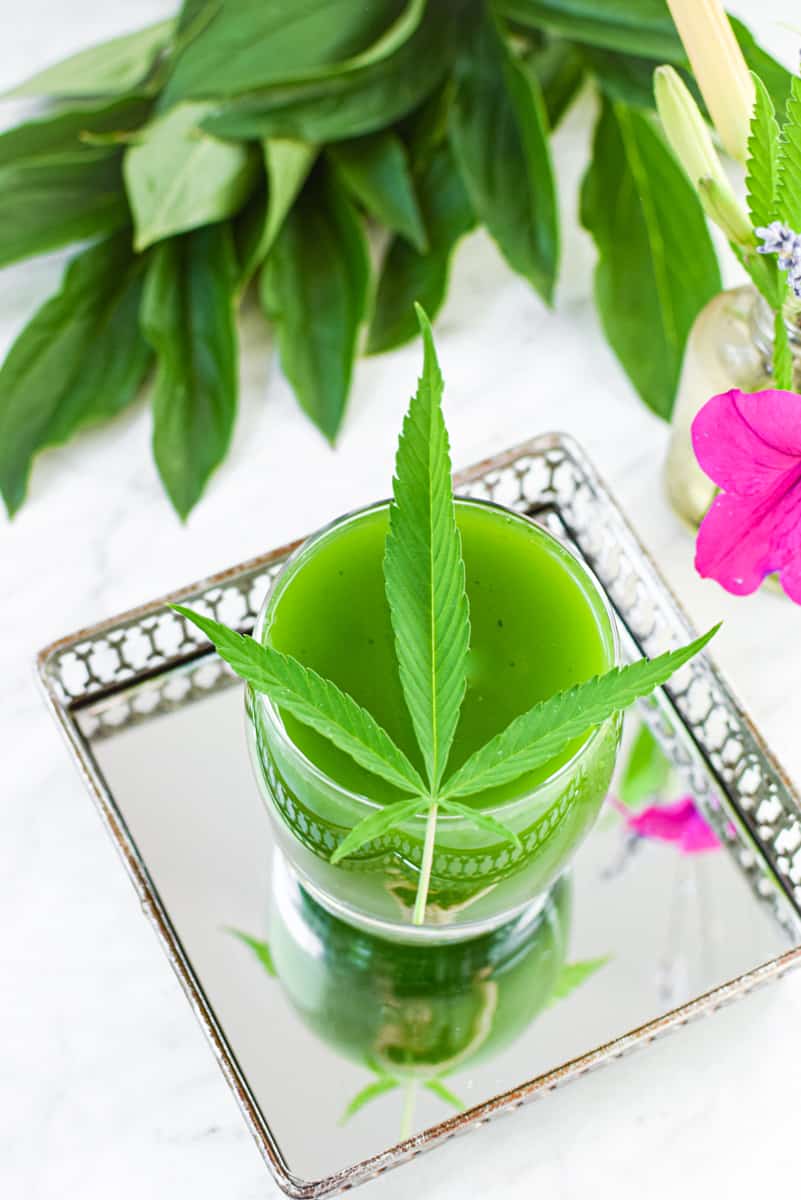
What Can I Make?
When it comes to what kind of edibles you can make with trim, the options are endless – cannabis cookie dough, anyone?
Just remember, your cannabis edibles may not be as strong when using trim.
Cannabis Infusions & Extractions
Easy Cannabis Coconut Oil Recipe
All Things Cannabis Oil
How to Make Cannabis Olive Oil
All Things Cannabis Oil
Easy Cannabis-Infused MCT Oil
Cannabis Infusions & Extractions
Easy Homemade CBD Oil Recipe
Cannabis Infusions & Extractions
How to Make CBG Oil + The Benefits
Cannabis Infusions & Extractions
How to Make CBN Oil for Sleep
Use Trim to Make Cannabutter
It doesn’t have to be hard! You can use a crockpot, Instant Pot, or stovetop to easily make cannabutter at home.
Cannabis Infusions & Extractions
Crockpot Cannabutter 🧈 Photos & Video
Cannabis Infusions & Extractions
Instant Pot Cannabutter or Oil » Easy Guide
All Things Cannabutter
Easy Stovetop Cannabutter in a Mason Jar
Use Trim to Make a Tincture
Decarb and make a Green dragon or Golden dragon tincture. Don’t decarb if you want to make a CBDA or THCA tincture. Learn the difference between the two here.
Tincture Resource Guide
The Top 10 Benefits of Using a Cannabis Tincture
Cannabis Infusions & Extractions
Easy Green Dragon Recipe » Cannabis Alcohol Tincture
Cannabis Infusions & Extractions
Golden Dragon QWET Cannabis Freezer Tincture
Cannabis Infusions & Extractions
How to Make a CBDA Tincture
Cannabis Infusions & Extractions
How to Make a THCA Tincture
Articles & How-To Guides
How to Evaporate Alcohol From Tinctures
Cannabis Infusions & Extractions
How to Make Full-Extract Cannabis Oil (FECO)
Cannabis Dessert Recipes
How to Make Cannabis Sugar – Quick & Easy Guide
Cannabis Sides & Snack Recipes
Quick & Easy Cannabis-Infused Salt
Use Trim to Make a Staple Recipe
Stock your pantry with these classic staple items like tea, milk, and honey.
Cannabis Drink Recipes
9 Ways To Make Cannabis Tea
Cannabis Drink Recipes
Easy Infused Cannabis Milk or Cream
Cannabis Infusions & Extractions
Easy Cannabis Honey » Two Ways!
Use Trim as a Spice Additive
Decarb your trim and grind it into a fine powder to use as a spice in many different recipes, or decarb and grind the material into a powder to fill capsules.
Articles & How-To Guides
How To Use Just Decarbed Cannabis in Edibles
Gluten-Free
Easy Savory CBD Seasoning & Rub
Cannabis Sides & Snack Recipes
Homemade Cannabis-Infused Taco Seasoning
Cannabis Infusions & Extractions
How to Make Cannabis Capsules
Use Trim to Make Topicals
Trim can absolutely be used to harness the topical benefits of cannabis!
Cannabis Topicals
8 Reasons to Try Cannabis Topicals for Better Skin
Cannabis Topicals
How to Make Cannabis Lip Balm
Cannabis Topicals
Easy Homemade Cannabis Salve Recipe
Cannabis Topicals
Homemade Cannabis Massage Oil
Collect The Kief
If you prefer to leave the nutrition and chlorophyll behind, you extract the kief, or trichomes, from the plant.
You can get kief from the trim in a couple of simple ways.
For professional cultivators, the best way to go about it is using a dry sift tumbler. It’s convenient and easy for large operations.
As a home cultivator, consider using a silkscreen or a bud trimmer. The latter automatically collects your kief as you harvest your yield.
From there, you can decide to make concentrates with it and use it as you see fit.
This is also a great opportunity to make bubble hash or fresh rosin if you have a rosin press.
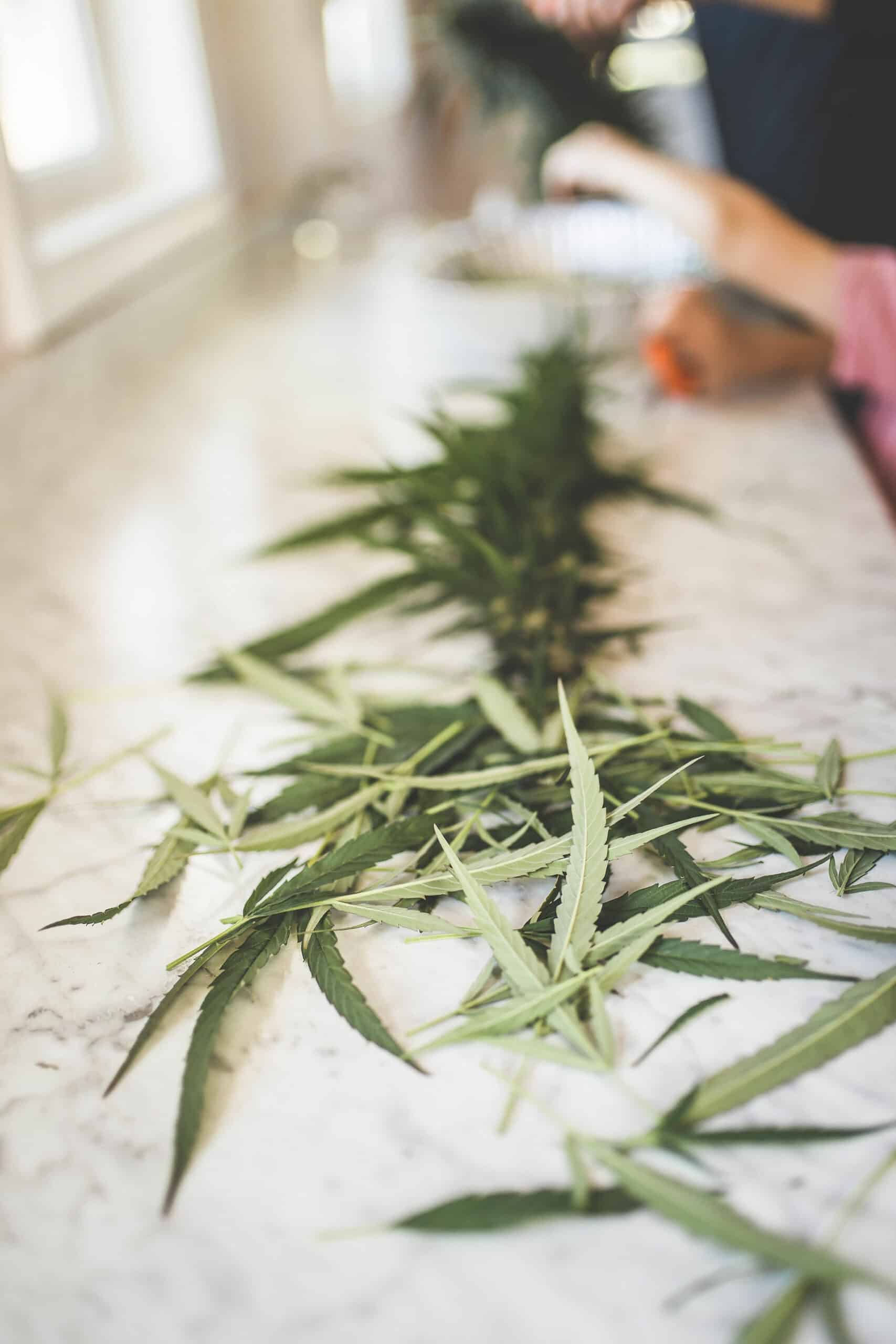
How to Calculate the Potency
Calculating the potency of trim is nearly impossible without lab testing.
However, many people want at least a rough guesstimate of the mg of THC in their end product.
If you know the percentage of cannabinoids (THC%) of your particular strain, you can start from there.
If we assume that trim is 50% less potent than flower, you would halve the amount.
For example, if your strain contains 22% THC, you could cut that in half and use 11% THC as the base measurement.
You can then input that variable into my edibles dosage calculator to get a rough idea of the potency you could be working with.

How To Use Trim To Make Edibles, Cannabutter, and More
Watch The Video
Equipment
- 1 Pair of scissors
What You Need
- 1 ounce cannabis trim
Instructions
- If you have fresh, wet trim, the first step is to dry it out. While this is not 100% necessary, it will help to remove excess water from the plant and help produce a better-tasting end product. The most simple way to dry trim is to place it in a brown paper bag and let it sit in a hot, dry area for 24-48 hours.
- Once your trim has been dried, it is time to decide if you want to decarboxylate. If you want to reap the benefits of activated CBD and THC, it is important to decarb first. If you want the benefits of CBDA or THCA, you can skip this process.
- Resist the urge to grind any of your material. Although this is tempting, it is not necessary and will only introduce more chlorophyll and unwanted taste into your end product.
- Choose a recipe you want to make with your trim. This can be cannabutter or cannabis oil made in the crockpot, Instant Pot, or on the stovetop. You can also make a cannabis tincture like the Green Dragon or Golden Dragon.
- Follow the recipe you have chosen accordingly, but know you must use more trim because it is less potent than traditional flowers. As a general rule of thumb, it is recommended to double up on the amount of trim used for best results.
Notes
Frequently Asked Questions
Yes, if you want to reap the benefits of activated cannabinoids like THC and CBD, you will need to decarb the marijuana trimmings first. This can be as simple as placing your desired grams of cannabis on a baking sheet or parchment paper and baking for a specific amount of time.
Yes! While it may be lower potency, there are many ways to use up your leftover plant material after making your infusion.
The cooking process is exactly the same for making marijuana butter any other way, except you may need to use more cannabis leaves. There are several different methods to make a water bath, add a few cups of water to a double boiler or crockpot. Then combine a few sticks of butter and cannabis in a mason jar. Let cook for 4 hours before straining.
Large fan leaves have a lot of nutritional value but negligible THC content, so it is important to keep this in mind. Fewer cannabinoids mean fewer benefits from your end cannabis products.
Most home growers have easy access to large amounts of trim from tending to their own plants. The easiest way to get trim material is to grow your own or ask a friend who grows – cannabis users tend to be very generous!
Final Thoughts
Trim is more useful than most people assume, and you can use it on almost anything!
As you embark on the exciting journey of utilizing cannabis trim, I hope this guide has showed you the many different possibilities that await you in the kitchen.
If you’re eager to enhance your harvest season with more invaluable insights and practical advice, don’t miss out on the chance to grab my FREE harvest resource guide.
It’s designed to empower you with everything you need for a successful and stress-free harvest.
Simply sign up below to receive your guide and let’s make the most of this bountiful season together! Happy harvesting! 🌿🎉💚
More Guides You Will Love
Articles & How-To Guides
Meet the Female Cannabis Plant: Her Parts + Uses
Articles & How-To Guides
What You Need To Know About Cannabis Trichomes
Articles & How-To Guides
How to Use Cannabis Fan Leaves in Edibles
Articles & How-To Guides

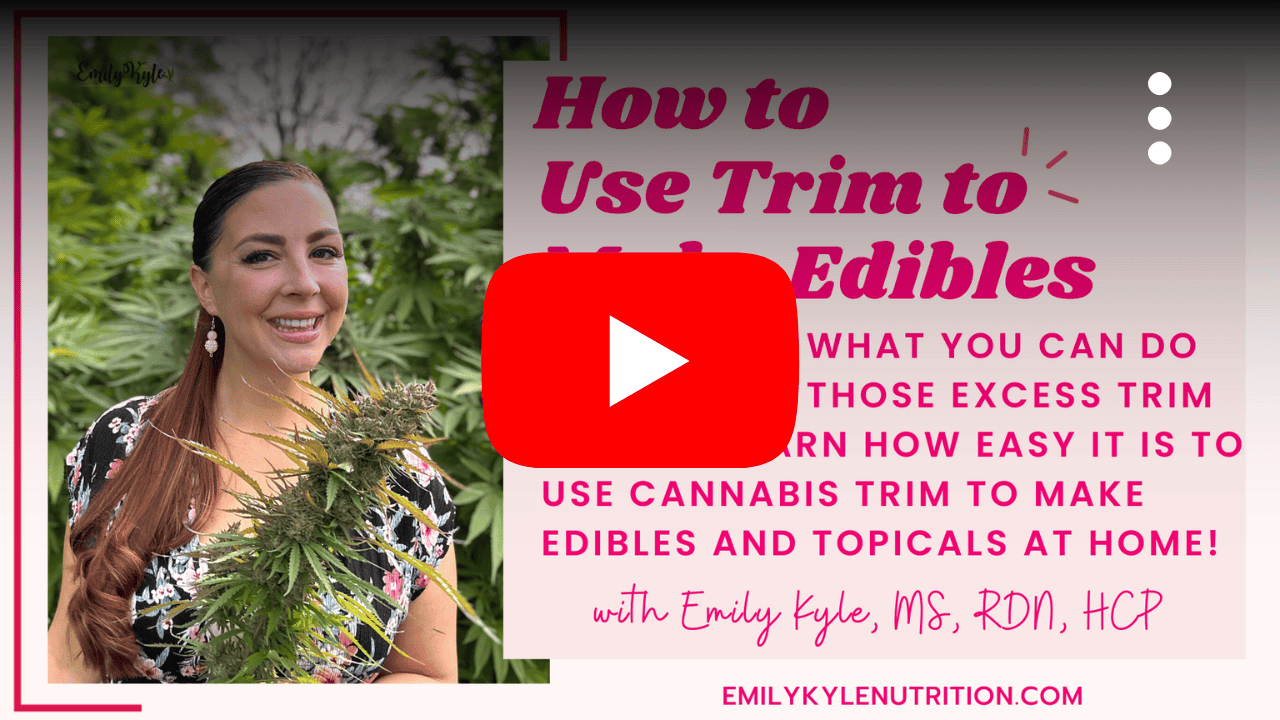
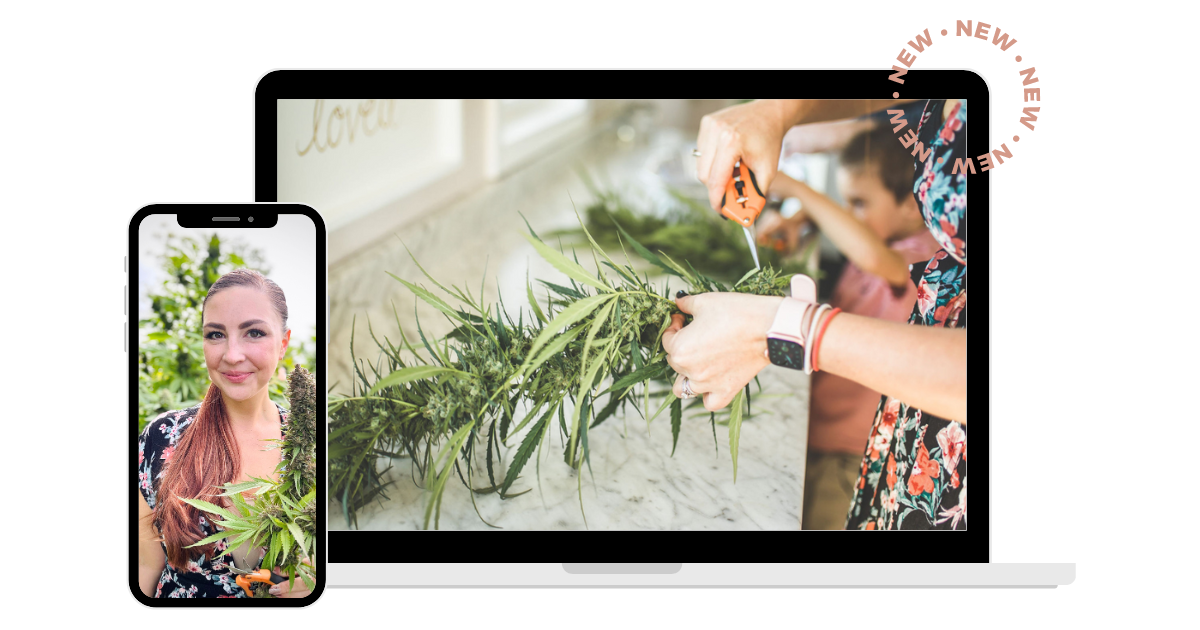
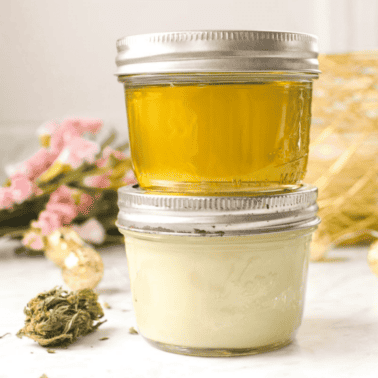
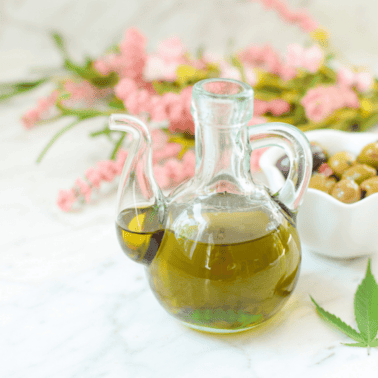
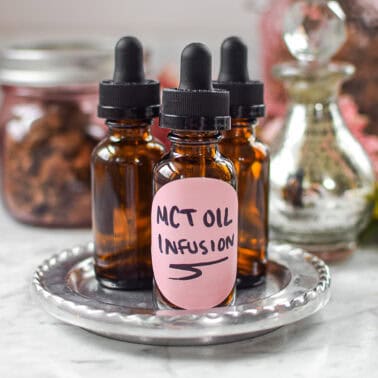
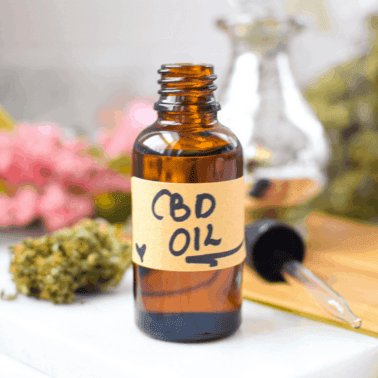
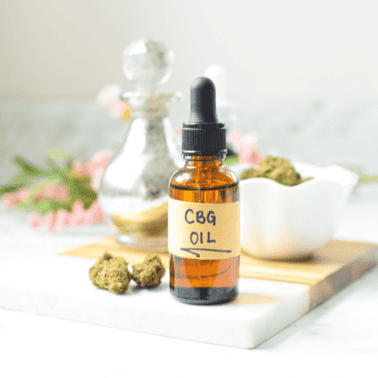
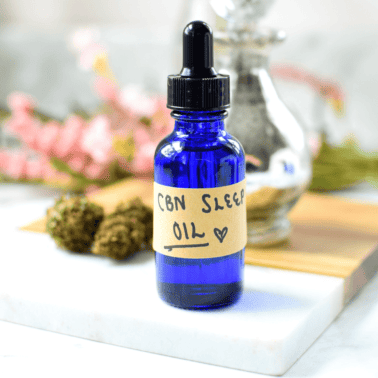
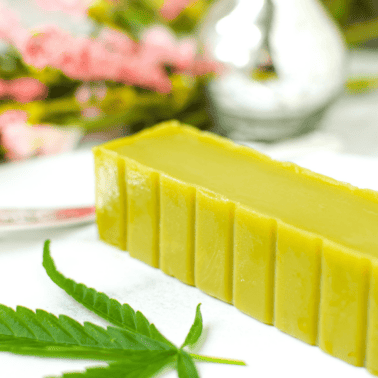
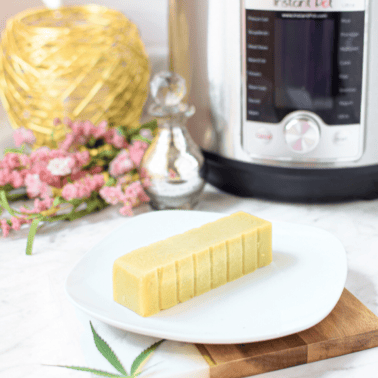
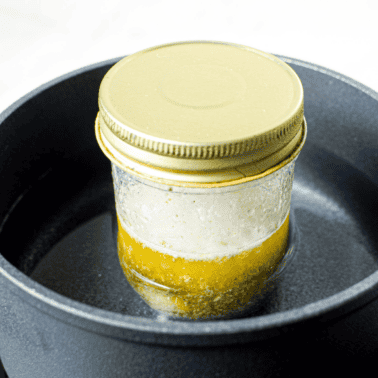
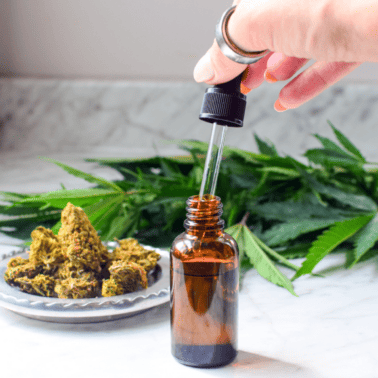
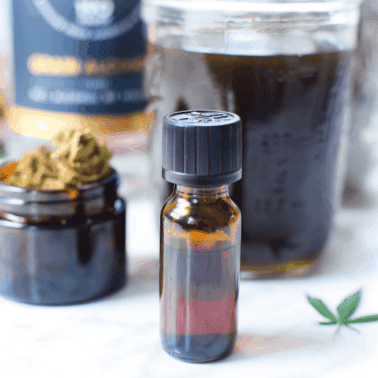
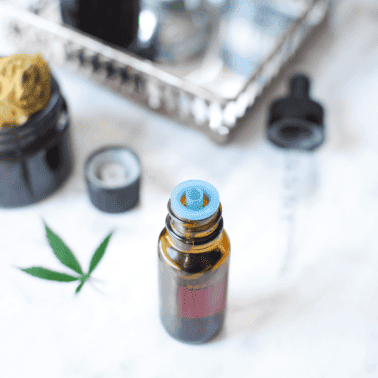
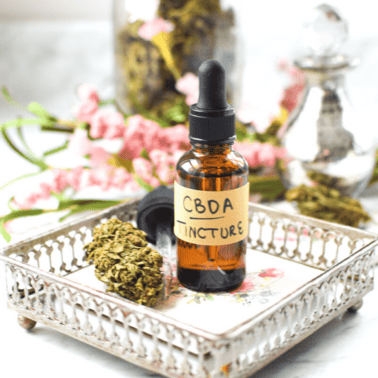
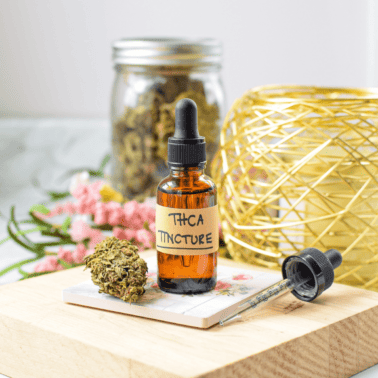
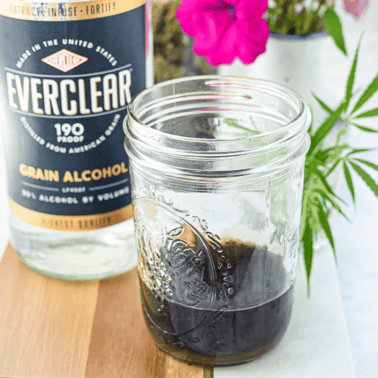
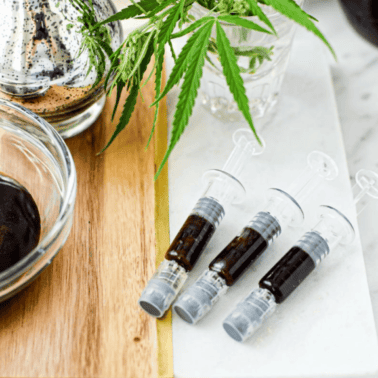
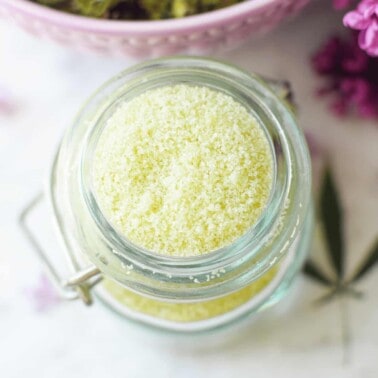
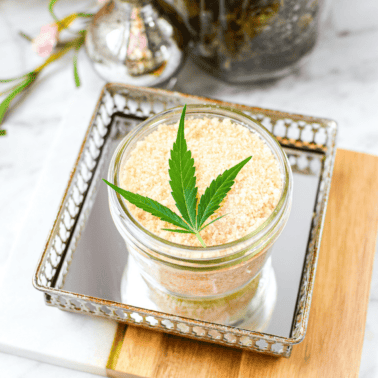
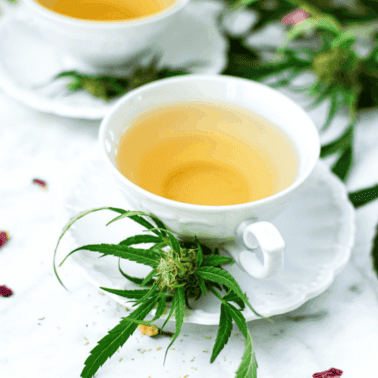
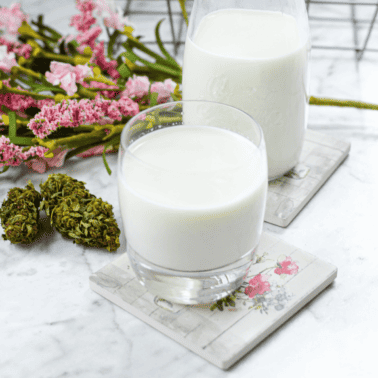
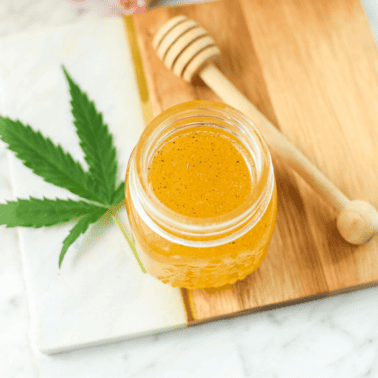
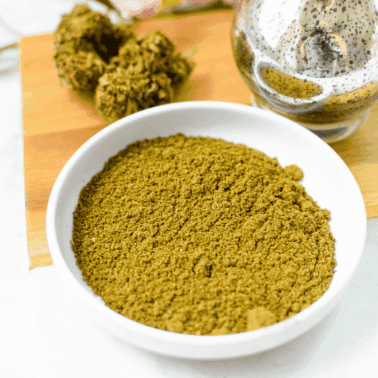
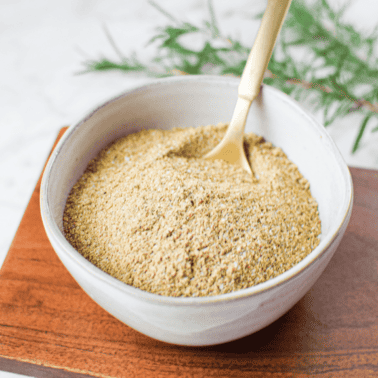
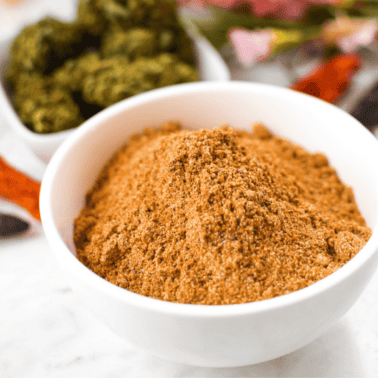
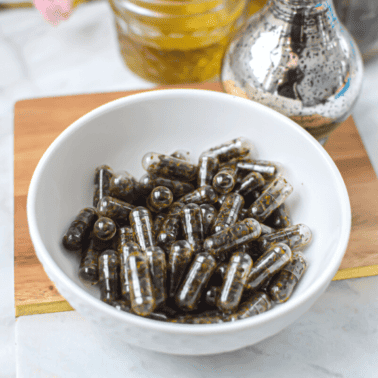
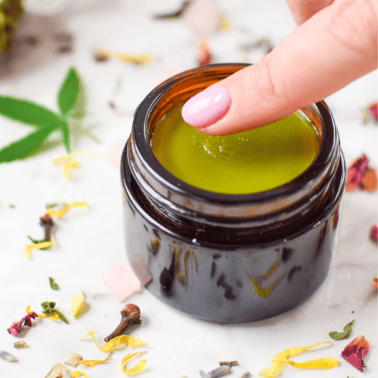
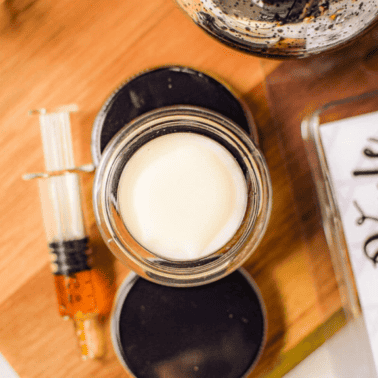
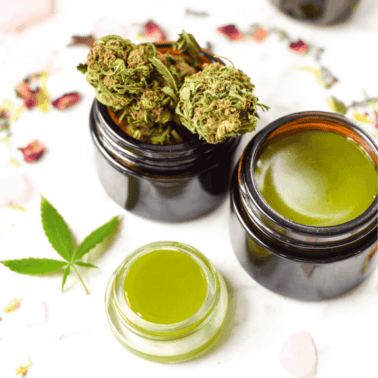
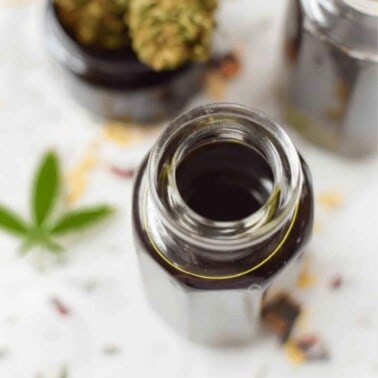
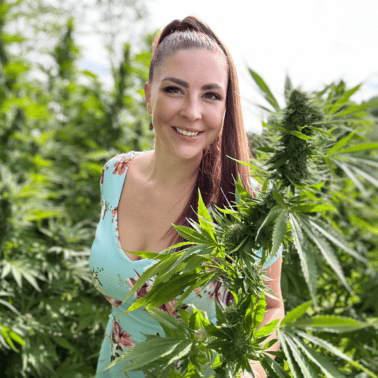
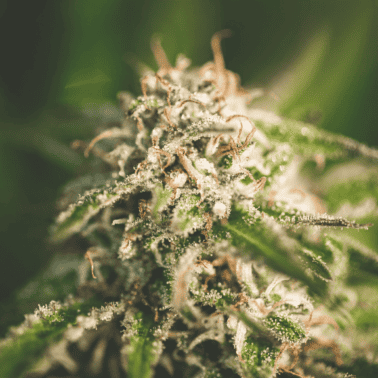
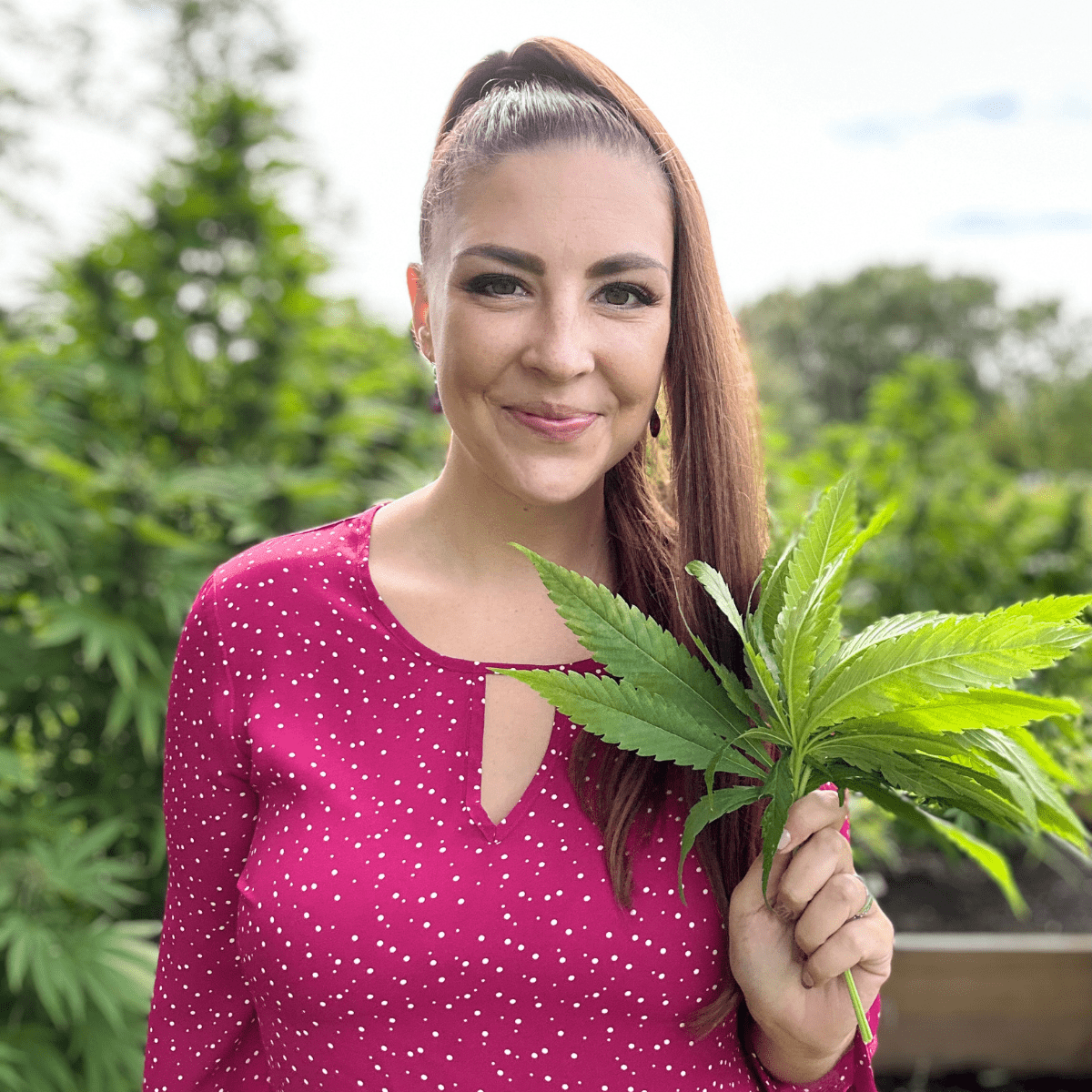
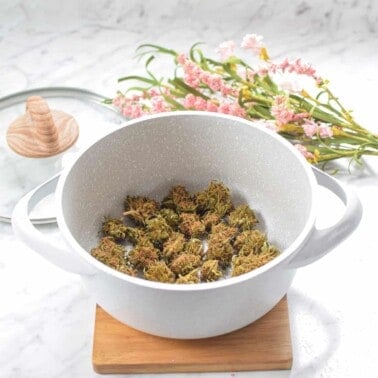









Hello, could you kindly tell, how to proceed when the amount of trim is superior to the oil ratio ? It just doesn’t cover all the trim and I dont want to loose it.
Thank you so much for reaching out, Puhoy! If you have more trim than what your oil ratio can fully cover, increase the amount of oil slightly until all of the material is covered. This way, you won’t lose any—and you can make the most out of your ingredients. 😊
What ratio would you use to make this MCT tincture with rosin instead of flower?
Hi Mindy. The ratio will depend on the potency of your rosin, but a common starting point is 1:10 (rosin to MCT oil). Adjust based on your desired strength!
Hi, I am find your information fascinating 😊 I have grown 4 plants 🪴 from seeds bought from a local seed shop, I have inflammatory osteoarthritis and I am aiming at making a painkilling balm, do I need to do the decarboxylation process or can I put it in the slow cooker to heat it, is it best to put water in the bottom and use a container for the dried cannabis and oils, can I add beeswax and shea butter at this point too? Thanks 🪴
Hi Sharon. Everything you need to know for your balm is here: Cannabis Salve Recipe with THC or CBD. You definitely want to decarb for full activation, but if you prefer the slow cooker, you can run the infusion for twice as long. The salve recipe will walk you through the steps of when to add all the ingredients! Let us know if any other questions come up. Happy infusing!
I’m using trim, 1oz for 2 sticks of butter. The butter melted in the jar with the trim but now I’ll I’ve got is buttery spinach, the trim absorbed all the butter! WTF?
I followed your recipe to the tee. Now what do I do?
Hi David. What method of straining did you use to seperate the plant matter from the butter? French press sounds like the best method that would help you here. Letting the butter cool slightly before straining it will help filter out finer particles. Let us know it goes.
As yet I haven’t used my trim. There are so many sugar leaves, I don’t know if I should leave them on or cut them off?
Hi Deb. When it comes to using the trim, it really depends on your preference and what you plan to do with it. Some people choose to leave the sugar leaves on if they’re using for edibles, while others prefer to remove them for a smoother smoking experience. It’s really a matter of personal preference. I hope this helps!
Oh my I’m learning so much!! Thank you! My question is, I have so much cannabis, does it go stale? Can I keep it in the freezer?
Hi Deb. We’re thrilled to hear you’re learning so much! Yes, cannabis can go stale over time, especially if not stored properly. While it’s possible to store cannabis in the freezer, it’s generally not recommended because freezing can make the trichomes (the parts of the plant that contain THC) brittle and they can break off, which could reduce potency. Instead, it’s best to store your cannabis in a cool, dark place in an airtight glass container to keep it fresh. I hope this helps!
Very insightful article Emily! You have a great way of breaking down information to be easily digestible. Let’s face it, learning all the ins and outs of cannabis and edibles can be challenging for some. There’s so much knowledge to be learned, but you always come through with great material like this. I would love to start growing my own and saving this article for future reference. Thank you!
Hi Ebony. Thank you so much for your kind words! It’s always our goal to make complex topics more approachable. I’m thrilled to hear that you’re considering growing your own cannabis. Remember, every great grower started with a single plant. Happy growing! 🌱
Your video on sugar leaves gets two thumbs up. Just decarb, a quick trip in a blender, and you’ve got something useful. I put a 1/4 tsp. on a cracker w/peanut butter.
It’s an amazing plant that’s fun to grow with the anticipation of the effort 🥴
Thanks Emily.
Hi Mike. Your two thumbs up put a smile on our faces! We love hearing about unique recipes like your tasty cracker and peanut butter combo! The joy in growing this incredible plant is what it’s all about. Thanks for being a part of our community!
Thank you for your information and expertise
Do I need to cure trim /sugar leafs before using?
What about curing buds? Is that important?
Thanks again you are awesome 🌱
Hi Kathy. Curing trim/sugar leaves isn’t necessary before use, especially if you’re planning to use them quickly. As for buds, curing is highly recommended as it helps break down chlorophyll, leading to smoother smoke, and it can also enhance the potency and flavor of your buds. Thank you for your kind words!
I always wonder about the benefits of THC in balm as I have read the intoxicating elements cannot cross the skin barrier. I make balm with CBD as what I want from that plant can get into your circulatory system but wonder about what benefits I’m getting from a THC balm? Just curious and thank you for the article. I use my trim for making butter.
Hi Steven. This is a great question. While it’s true that THC can’t cross the skin barrier to produce psychoactive effects, topical applications can still have localized benefits like reducing pain and inflammation. Adding THC can enhance the effects of your CBD balms even further. Thanks for engaging with our content and being part of our community!
Your information is always clear and factual. Your knowledge on cannabis is endless. I always enjoy the tips and tricks you share! Thank you 😊
Hi Teash. It’s fantastic to know that you’re finding our information clear, factual, and beneficial. We’ll continue sharing tips, tricks, and insights that hopefully make your cannabis journey more enjoyable and informed. Thanks for being a part of our wonderful community! 😊
I love everything you teach! So much simpler!
Hi Betsy. We’re absolutely thrilled to hear that you’re finding the information helpful and easy to understand. It’s our goal to make things as simple and accessible as possible. Keep enjoying your learning journey, and thanks for being a part of our community!
Hi Emily! I didn’t see the video but I really liked your post about trim. I started using trim to make cannabutter about 6 months ago. It is the perfect strength for me – I have a cup of coffee with sugar, cream and cannabutter in the morning and I’m good all day with a nice relaxing, pain free, day!
I read all of your emails and follow you on Pinterest! Thanks for all that you do!
Hi Carole. It’s wonderful to hear that you’ve found the perfect strength for your cannabutter, and that it’s contributing to relaxing, pain-free days for you. That morning coffee routine sounds absolutely delightful! We’re so grateful for your support and engagement, both through my emails and on Pinterest. Keep enjoying your beautiful mornings and thank you for being part of our community!
I save my Sugar leaves to make infused coconut oil. I use the oil to make body butters. Love the pain reducing it gives. I cook it about 8 to 10 hours in my slow cooker. Works great! Thanks for all your advice, love it all!!
Hi Cheryl. It’s fantastic to hear that you’re making good use of your sugar leaves and experiencing such great results with your homemade body butters. Thank you for sharing with our readers! Keep up the amazing work, and continue enjoying your pain-reducing creations!
I love the information that you provide both, in articles and the videos. I’m 64 years old and have an indoor grow. Personal use only, and with the added help from you I’m now making my own edibles. THANK YOU SO VERY MUCH!
Hi Kenneth. It warms our hearts to hear that you’re finding the articles and videos beneficial for your indoor grow and edibles journey. Keep up the fantastic work, and don’t hesitate to reach out if you have any questions or need further assistance. Happy growing and baking!
Very good video on trim use
Hi Joan. We’re really glad to hear you found the video on trim use helpful. It’s always our aim to provide content that can assist and enlighten our readers. Thanks for your support, and happy trimming!
Emily, Iv got Bud that I suspect Bud rot. Can I make bubble hash or gummy’s out of this? Thank you
Hi Brent. It’s important to tread carefully when dealing with bud rot, as it can potentially introduce harmful toxins and mold spores. While some sources suggest that bubble hash could be made from moldy buds, we highly recommend against it. As for gummies, I wouldn’t recommend using rotted buds due to potential health concerns. Always prioritize safety when dealing with fungus and your health. I hope this helps!
Love reading and trying out the recipes and the support that’s always there…
Hi Dolly. Thank you so much for your kind words! It makes us happy to hear that you’re enjoying the recipes and feeling supported. Don’t hesitate to reach out if you ever have questions or need further guidance. Keep trying new things and happy cooking!
Hi Emily! My husband and I grow, eat smoke etc and we love your content. Thank you so much for all that you share to make the world a better place with Cannabis. The trim video was chock full o information! The one thing I’d like to see is some examples of your trim and supplies that you use for a batch of butter or oil. Maybe you have done this in another video so my apologies
Hi Thaedra. We’re truly delighted to hear that you and your husband find value in our content. Knowing that it’s helping others navigate the wonderful world of cannabis makes it all worthwhile. Your suggestion for a video showcasing Emily’s trim and supplies is excellent. While we don’t have a specific video focused on this yet, it’s definitely something to consider for future content. Thanks for your support and feedback!
I am in the learning stages of all this. I don’t grow but just have some old stuff someone gave me. I rarely smoke so I thought I might be able to make it into some honey to be used in tea. I thought your site may help me figure out how to do it. Thanks
Hi Jessie. It’s wonderful to hear that you’re starting your journey into the world of cannabis-infused products. Using old cannabis to make honey for tea is a creative idea! Here is a guide to help you with that: Easy Cannabis Honey » Two Ways!. We have plenty of resources on our site to guide you along your cannabis journey and we’re more than happy to point you in the right direction. Feel free to reach out anytime. You’ve got this!
Love it! I’ve used this recipe time and again, i have a few plant a year and I have a lots of trim which I use to make feco.
Hi David. We’re so glad to hear that you’ve been loving this recipe and making good use of your trim! It’s remarkable how much value we can get from every part of the plant, isn’t it? Keep up the great work and happy cooking!
Interesting information on how to use the trim. I made cannaoil and was wondering what to do with the oil soaked flower leftover ? If I put it back in the oven at 240 degrees like I was decarbing would it dry them out or just add them to a recipe ? Thanks
Hi Richard. You can use your leftover cannabis pulp in a variety of ways, but I don’t recommend putting it back in the oven. The additional heat will cause the cannabinoids to continue to degrade, so you’ll end up with a sleepier end product. You’re better off using the pulp directly in a recipe; coffee and tea are a fan favorite. Here is a guide with helpful tips on how to use your leftover pulp: 15 Best Ways To Use Leftover Cannabis Pulp. I hope this helps!
Very informative video! Thanks, Emily! You’re my “go-to guide” on anything cannabis
Hi Shireen. We’re absolutely thrilled to hear that you found the video informative and that we can be your ‘go-to guide’ in the world of cannabis. It’s a fascinating field, isn’t it? Together, let’s keep learning, growing and demystifying the world of cannabis. Happy exploring!
Great job
Hi Michael. We’re glad you loved the video! Thank you for being a part of our community.
I really like this video, explaining with visuals is very helpful. I thought I knew which leaves were which and was wrong. Thank you for sharing all the information in a easy to understand format.
Hi Jeff. We’re thrilled to hear that you found the video and visuals helpful! It’s a wonderful feeling when we can learn something new, even about things we thought we knew well. Your kind words brighten our day. Let’s keep learning and growing together.
Great recipe
Thanks for sharing
Hi Rebecca. We’re delighted you enjoyed the recipe! We love sharing culinary adventures with our readers – your feedback is what makes our community so special. Happy cooking!
Great informative video!
Hi Mary. We’re so glad to hear you found the video informative! We’re here to support your journey every step of the way.
Excellent video full of valuable information.
Thanks Emily!!
Hi Christie. We’re thrilled to hear that you found the video informative and valuable! Thanks for being a part of our community!
Thanks for the great advice! I just gathered some trimmed sugar leaves from a dried plant so this is perfect timing for me. Happy harvest season!
Hi Kristina. We’re thrilled the timing was perfect for you! I’m excited for what you’ll make with them. The possibilities are endless. Happy harvest season to you too!
Terrific video! I’ve always thought it had to be wasteful to throw away that trim. I have a magical butter machine and it even specifies you can add stems. I am wondering what decarbed seeds might do if they got in there. Smoking them used to give me a headache before I knew better.
Hi Erica. You’re spot on, it’s wonderful to make use of as much of the plant as possible. As for decarbed seeds, while they won’t negatively impact your infusion, they won’t add much to the potency. To ensure you have the most enjoyable experience, it’s best to separate them out. We’re glad you enjoyed the video!
Emily’s guidance has been a game-changer! Her way with words has really simplified the trimming process making it not only easy to understand but also enjoyable to DIY.
OMG so informative. I loved the video!!! Thank you
Hi Stephanie. We’re delighted to hear you found the video informative and enjoyable! That’s exactly what we aim for. Thanks for being a part of our community!
I use my trim as spice….mixed with other common spices I regularly use
Hi Christy. I love this! Have you seen Emily’s Easy Savory CBD Seasoning & Rub recipe? It’s worth checking out.
How to take chlorophyll out of trim using stove
Hi Leslie. We are actually in the process of testing out proper methods, but it is thought that 30 seconds of boiling helps remove chlorophyll.